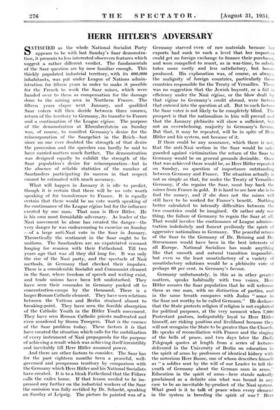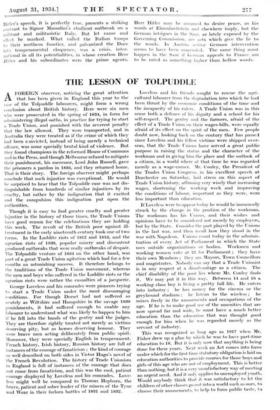HERR HITLER'S ADVERSARY
SATISFIED as the whole National Socialist Party appears to be with last Sunday's Saar demonstra- tion, it presents to less interested observers features which suggest a rather different verdict. The fundamentals of the Saar question are by now familiar enough. This thickly populated industrial territory, with its 800,000 .inhabitants, was put under League of Nations admin- istration for fifteen years in order to make it possible for the French to work the Saar mines, which were handed over to them as compensation for the damage done to the mining area in Northern France. The fifteen years elapse next January, and qualified Saar voters will then decide between three. courses, return of the territory to Germany, its transfer to France and a continuation of the League regime. The purpose of the demonstration at Ehrenbreitstcin on Sunday was, of course, to manifest Germany's desire for the reincorporation of the Saargebiet in the Reich—but since. no one ever doubted the strength of that desire the procession and the speeches can hardly be said to have carried matters much further. The demonstration was designed equally to exhibit the strength of the Saar population's desire for reincorporation—but in the absence of reliable statistics of the number of Saarlanders participating its success in that respect cannot be estimated with much accuracy.
What will happen in January it is idle to predict, though it is certain that there will be no vote worth speaking of for transference to France. It is equally certain that there would be no vote worth speaking of for continuance of the League regime but for the influence exerted by one man. That man is Herr Hitler. He is his own most formidable adversary. As leader of the Nazi movement he alone has created the danger—the very danger he was endeavouring to exorcize on Sunday —of a large anti-Nazi vote in the Saar in January. Theoretically the sentiment in the Saar ought to be uniform. The Saarlanders are an expatriated remnant longing for reunion with their Fatherland. Till two years ago that was all they did long for. It was only the rise of the Nazi party, and the spectacle of Nazi methods, in Germany that checked their impulse's. There is a considerable Socialist and Communist element in the Saar, where freedom of speech and writing exist, and trade unions have been left undisturbed. They have seen their comrades in Germany packed off to concentration-camps by the thousand. There is a larger Roman Catholic element.' They have seen relations between the Vatican and Berlin strained almost to breaking-point. They have seen the forcible absorption of the Catholic Youth in the Hitler Youth movement. They have seen Roman Catholic priests maltreated and even murdered by Storm Troopers. That is the essence of the Saar problem today. These factors it is that have created the situation which calls for the mobilization of every instrument of Nazi propaganda for the purpose of achieving a result which was achieving itself irresistibly and inevitably till Herr Hitler assumed power.
And there are other factors to consider. The Saar has for the past eighteen months been a peaceful, well- governed and prosperous territory by comparison with the Germany which Herr Hitler and his National Socialists have created. It is to a bleak Fatherland that the Fiihrer calls the exiles home. If that lesson needed to be im- pressed any further on the industrial workers of the Saar the omission was fully rectified by Dr. Schacht, speaking on Sunday at Leipzig. The picture he painted was of a Germany starved even of raw materials because her exports had sunk to such a level that her importers could get no foreign exchange to finance their -purchases, and were compelled to resort, as in war-time, to substi- tutes more costly and less satisfactory, but home- produced. His explanation was, of course, as always, the malignity of foreign countries, particularly those countries responsible for the Treaty of Versailles. There was no suggestion that the Jewish boycott, or a fall in efficiency under the Nazi regime, or the blow dealt by that regime to Germany's credit abroad, were factors that entered into the question at all. But to such factors the Saar voter is not likely to be completely blind. The prospect is that the nationalism in him will prevail and that the January plebiscite will show a sufficient, but not an overwhelming, majority in Germany's favour. But that, it may be repeated, will be in spite of Herr Hitler and his system, not because of it.
If there could be any assurance, which there is not, that the anti-Nazi section in the Saar would be safe- guarded against victimization the return_ of the Saar to Germany would be on general grounds desirable. Once that was achieved there would be, as Herr Hitler repeated on Sunday, no question of importance outstanding between Germany and France. The situation actually is not so simple as that, for under the Treaty of Versailles Germany, if she regains the Saar, must buy back the mines from France in gold. It is hard to see how she is to find the money, and if she does not the mines will still have to be worked for France's benefit. Nothing better calculated to intensify difficulties between the two countries could be imagined. Or rather only one thing, the failure of Germany to regain the Saar at all. That would involve the continuance of League adminis- tration indefinitely and foment perilously the spirit of aggressive nationalism in Germany. The peaceful return of the Saar to the Germany of Dr. Bruning and Dr. Stresemann would have been in the best interests of all Europe. National Socialism has made anything like that smooth and natural transition impossible, but even so the least unsatisfactory of a variety of unsatisfactory solutions would be a plebiscite vote of perhaps 60 per cent. in Germany's favour.
Germany unfortunately, in this as in other greater matters, speaks habitually with two voices. Herr Hitler assures the Saar population that he will welcome them as one man, with no distinction of parties, and in the same breath compares with Judas " some in the Saar not worthy to be called Germans." He declares that the State protects religion if religion is not exploited for political purposes, at the very moment when 7,000 Protestant pastors, indisputably loyal to Herr Hitler himself, are risking position and livelihood because they will not recognize the State to be greater than the Church. He speaks of reconciliation with France and the ringing of the bells of peace, and two days later the Dail y Telegraph quotes at length from a series of lectures delivered in the University of Berlin on education in the spirit of arms by professors of identical kidney with the notorious 'Herr Banse, one of whom describes himself as " a soldier sent by the will of our Leader to tell the youth of Germany about the German man in arms." Education in the spirit of arms—here stands nakedly proclaimed as a definite aim what was bound in any case to be an inevitable by-product of the Nazi system. What good is it to talk of peace when every element in the system is breeding the spirit of war ? Herr Hitler's speech, it is perfectly true, presents a striking contrast to Signor Mussolini's ebullient outbreak on a militant and militaristic Italy. But let cause and effect be marked. What called the Italian troops to their northern frontier, and galvanized the Duce into temperamental eloquence, was a crisis, inter- national in all its potentialities, in whose creation Herr Hitler and his subordinates were the prime agents. Herr Hitler may be assumed to desire peace, as his words at Ehrenbreitstein and elsewhere imply, but the German intrigues in the Saar, as lately exposed by the Governing Commission, are acts which give the lie to the words. In Austria active German intervention seems to have been suspended. The same thing must happen in the Saar if German appeals to France are to be rated as something higher than hollow words.







































 Previous page
Previous page